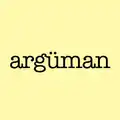Argüman
Argüman is a free and open source software for collective structured argumentation and argument analysis via argumentation graphs or argument maps in which the type of connections can be specified.[2][3][4][5][6] It allows users to create collaborative "semantic maps" of arguments in well structured tree formats and share them with an audience and potential participants.[7][3][8] The website implementing the software is down as of 2023. There also is a mobile version of the tool. The project was started, in 2014, and largely built by developers in Turkey.[1]
 | |
| Repository | github |
|---|---|
| Written in | Python / Django[1] |
| License | The license appears to be the GNU General Public License |

Some studies used or investigated excerpts of argumentations on the platform.[9][10] Unlike the larger and functional alternative Kialo, which is structured using only 'Pro' and 'Con' relations,[2] argüman arguments are structured by three types of premises – 'because', 'but', and 'however'.[3] As of the latest version, debates are presented in their entirety as a large tree which may be harder to navigate than other formats – for instance, trees "can become extremely dense, and the interface does not make it obvious which arguments the user should pay attention to".[2] Users can also flag arguments for fallacies. The site also had a Turkish-language subdomain.[11]
A researcher suggested the concept of the Semantic Web-interoperability could be useful for argumentative structures on the Web, going beyond the conventional flat structures of discussions and lack of characterizations of their components as implemented in argüman.[12] There is research into how to automatically use these collaborative argumentation graphs, which is a "very active" topic in Artificial Intelligence.[4] There also is research into applying conclusion-making methods to the debates or their data such as bipolar weighted argumentation frameworks – this could be a way to find out what the current conclusion of debates like "Computer Science is not actually a science" is.[13] A study suggests it could be useful for the development of critical thinking skills.[14]
See also
References
- "AMENDMENT: Arguman.org". archive.fosdem.org. Retrieved 14 June 2023.
- Yuan, An (2018). Collective debate (Thesis). Massachusetts Institute of Technology. hdl:1721.1/122893. Retrieved 13 June 2023.
- Pührer, Jörg (2017). "ArgueApply: A Mobile App for Argumentation". Logic Programming and Nonmonotonic Reasoning. Lecture Notes in Computer Science. Vol. 10377. Springer International Publishing. pp. 250–262. doi:10.1007/978-3-319-61660-5_23. ISBN 978-3-319-61659-9.
- "Argumentation Ranking Semantics based on Propagation". Retrieved 13 June 2023.
- Gargouri, Anis; Konieczny, Sébastien; Marquis, Pierre; Vesic, Srdjan (2021). "On a Notion of Monotonic Support for Bipolar Argumentation Frameworks".
{{cite journal}}: Cite journal requires|journal=(help) - Jeuris, Steven (2018). "Socratrees: Exploring the Design of Argument Technology for Layman Users". arXiv:1812.04478 [cs.HC].
- Antonio, Cordón García, José (1 January 2018). Lectura, sociedad y redes: Colaboración, visibilidad y recomendación en el ecosistema del libro (in Spanish). Marcial Pons. ISBN 978-84-9123-626-9.
{{cite book}}: CS1 maint: multiple names: authors list (link) - "Argüman – About". Archived from the original on 2021-01-24.
- "Gradual Semantics Accounting for Similarity between Arguments" (PDF). Proceedings of the Sixteenth International Conference on Principles of Knowledge Representation and Reasoning.
- Hoffmann, Michael H. G. (1 June 2018). "The Elusive Notion of "Argument Quality"". Argumentation. 32 (2): 213–240. doi:10.1007/s10503-017-9442-x. ISSN 1572-8374. S2CID 254261703.
- Uzelgun, Mehmet Ali; Kucukural, Onder; Oruc, Raluni (2020). "Four Approaches in Argumentation Analysis". Connectist: Istanbul University Journal of Communication Sciences: 265–297. doi:10.26650/CONNECTIST2020-0666. S2CID 243065887. Retrieved 9 September 2023.
- Vetere, Guido (30 June 2018). "L'impossibile necessità delle piattaforme sociali decentralizzate". DigitCult - Scientific Journal on Digital Cultures. 3 (1): 41–50. doi:10.4399/97888255159096.
- Delobelle, Jérôme (12 December 2017). Ranking-based Semantics for Abstract Argumentation (phdthesis). Université d'Artois.
- "Bir Eleştirel Düşünme Çevrimiçi Aracı Olarak Arguman.org" (PDF). Retrieved 9 September 2023.